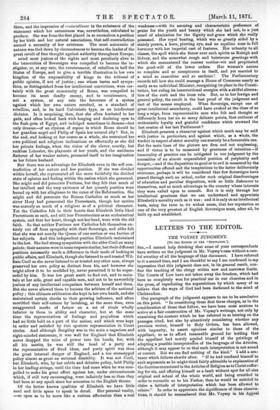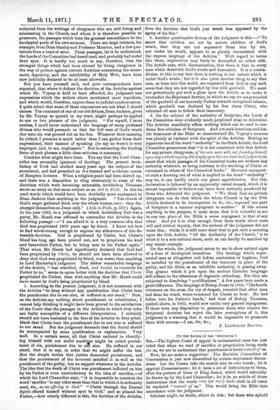LETTERS TO THE EDITOR.
THE VOYSEY JUDGMENT.
[TO THE EDITOR OF THE " SPECTATOR:1
SIR, —I cannot help thinking that some of your correspondents have written on the judgment in Mr. Voysey's case without a care- ful scrutiny of all the language of that document. I have referred to it a second time, and I am thankful to say I am confirmed in my impression that this judgment does not, in its general result, con- fine the teaching of the clergy within new and narrower limits. The Courts of Law have not taken away the freedom, which had been so completely won for practical use in our churches and in the press, of repudiating the superstitions by which many of us believe that the ways of God had been darkened to the mind of Christendom.
One paragraph of the judgment appears to me to be conclusive on this point. "In considering these first three charges, as in the consideration of those that follow, we have been most anxious to arrive at a fair construction of Mr. Voysey's writings, not only by examining the context which he has referred to as bearing on the passages cited, but also by attentively considering whether any previous writer, himself in Holy Orders, has been allowed, with impunity, to assert opinions similar to those of the appellant, so as to afford reasonable ground for holding that the appellant had merely availed himself of the privilege of adopting a possible interpretation of the language of the Articles, although it may appear to us that such interpretation is not sound or correct. But we can find nothing of the kind." I add a sen- tence which follows shortly after. "If he had confined himself to such arguments as he might think fairly adducible in explanation of the doctrine enunciated in the Articles of Religion as to Christ suffer- ing for sin, and offering himself as a lamb without spot for all sins original and actual of the whole world, and being crucified in order to reconcile us to his Father, then he would be entitled to claim a latitude of interpretation which has been allowed to others." In order to appreciate the significance of these observa- tions, it should be remembered that Mr. Voysey in his Appeal
collected from the writings of clergymen who are still living and ministering in the Church, and whom it is therefore possible to prosecute, the passages which bore the greatest resemblance to the inculpated parts of his own sermons. There are large extracts, for example, from Dean Stanley and Professor Maurice, and a few quo- tations from a tract of mine. These passages, let it be understood, the Lords of the Committee had heard read, and probably had under their eyes. It is hardly too much to say, therefore, that the strongest things which had been uttered by living clergymen in the way of protest against current doctrines concerning the atone- ment, depravity, and the infallibility of Holy Writ, have been now judicially declared to be at least allowable.
But you have yourself said, and your correspondents have repeated, that where it defines the doctrine of the Articles against which Mr. Voysey is held to have offended, the judgment uses expressions which the writers above mentioned must repudiate, and which would, therefore, expose them to judicial condemnation.
I quite admit that some of these expressions are not what I should choose. The comment of one of our old divines, Dean Jackson, given by Mr. Voysey as quoted in my tract, might perhaps be applied to one or two phrases of the judgment. "For myself, I must confess, I could never understand the language of many professed divines who would persuade us that the full vent of God's wrath due unto sin was poured out on his Son. Whatever their meaning be (which I presume is much better than I can gather from their expressions), their manner of speaking (to say no worse) is very improper, and, to me, unpleasant." But in estimating the binding force of such phrases a little close criticism is necessary.
Consider what might have been. You say that the Lord Chan- cellor was excusably ignorant of theology. The present Arch- bishop of York had studied many years ago the subject of the atonement, and had preached on it a learned and moderate course
Bampton lectures. When a religious panic had been stirred up, and there was a disposition to cling obstinately to some of the +doctrines which were becoming untenable, Archbishop Thomson wrote an essay on this same subject as an Aid to Faith. In this he used words which would have been decidedly more unpleasant to Dean Jackson than anything in the judgment. "The clouds of God's anger gathered thick over the whole human race : they dis- charged themselves on Jesus only." (Aids to Faith, p. 332.) Again, in the year 1862, in a judgment to which Archbishop Tait was a party, Mr. Heath was affirmed to contradict the Articles in the following passage :—" I am afraid it is a very common idea that God was propitiated 1800 years ago by blood. I know not how to find words strong enough to express my abhorrence of this de-
testable doctrine. God is propitiated by Christ, but Christ's blood has long ago been poured out, not to propitiate his kind Land benevolent Father, but to bring men to his Father again." That when Mr. Heath had significantly declared that God had been propitiated by Christ, he should not have been allowed to .deny that God was propitiated by blood, was worse than anything in Lord Hatherley's judgment. The rather remarkable language of the Article, "was crucified, dead, and buried, to reconcile his Father to us," seems to agree better with the doctrine that Christ propitiated the Father, than with anything that Mr. Heath could have meant by God's being propitiated by blood.
1. According to the present judgment, it is not consistent with the Articles "to deny without any qualification that Christ bore the punishment due to our sins, or suffered in our stead." Now, .as the Articles say nothing about punishment or substitution, I cannot help thinking it might have been proved to the satisfaction of the Court that the passages in the Articles to which they refer are fairly susceptible of a different interpretation. I certainly should not have hesitated in the face of the Articles to deny point- blank that Christ bore the punishment due to our sins or suffered in our stead. But the judgment demands that the denial should be accompanied by some qualification or explanation. Very well. In a certain sense, all that Christ endured in identify- ing himself with our sinful condition might be called punish- ment of sin, punishment due to our sins. He suffered in our .stead, that is to say, in order that we might suffer the less. But the simple notion that justice demanded punishment, and that the punishment of the innocent satisfied it as well as the punishment of the guilty, has no support whatever in the Articles. The idea that the death of Christ was punishment inflicted on him by his Father is even contradictory to the idea of sacrifice,—of which the Lord Chancellor says, "it is impossible to construe the word sacrifice ' in any other sense than that in which it is ordinarily used, viz., as an offering to God." "Christ through the Eternal Spirit offered himself without spot to God," and so pleased the Father,—how utterly different is this, the doctrine of the Articles, from the doctrine that God's just wrath was appeased by the agony of his Son !
2. Another questionable dictum of the judgment is this :—" To assert that children are not by nature children of God's wrath, that they are not separated from him by sin, nor under his wrath, appears to us plainly inconsistent with the express language of the Articles." With regard to terms like these, explanation may fairly be demanded on either side. The Article says, with discrimination, that there is that in every man which deserveth God's wrath and damnation. It is a contra- diction to this to say that there is nothing in our nature which is under God's wrath ; but it is also quite another thing to say that men, as born into this world, are separated from God in any such sense that they are not regarded by him with goodwill. We must not gratuitously put such a gloss upon the Article as to make it contradict the Baptismal Service, in which we say we are persuaded of the goodwill of our heavenly Father towards unbaptized infants, which goodwill was declared by his Son Jesus Christ, who exhorted all men to follow their innocency.
3. On the subject of the authority of Scripture, the Lords of the Committee were evidently much perplexed what to determine. The Articles manifestly affirm nothing which can be used to con- demn free criticism of Scripture. And yet such licentious and hos- tile treatment of the Bible as characterized Mr. Voysey's sermons was plainly at variance with the spirit of the Articles. Making an ingenious use of the word "authority" in the Sixth Article, the Lord Chancellor pronounces that "it is not consistent with that Article for any private clergyman, of his own mere will, not founding himself upon any critical inquiry, but simply upon his own taste and judgment, to assert that whole passages of the Canonical books are without any authority whatever, as being contrary to the teaching of Christ as contained in others of the Canonical books." However unexpect- ed such a drawing out of what is implied in the word " authority" may be, it can hardly excite any grave apprehension. But this declaration is followed by an apparently casual remark, which it is almost impossible to believe can have been seriously pondered by those who delivered the judgment. " We think that no private clergyman can do that which the whole Church is by the 20th Article declared to be incompetent to do, viz., expound' oue part of Scripture in a manner repugnant to another." If this means anything to the purpose, it must mean that it is unlawful to see in any one place of the Bible a sense repugnant to that of any
other. And yet it is clear enough, from those words about mere will and critical inquiry, that the authors of the judgment did not
mean this ; whilst it is still more clear that to put such a meaning upon the 20th Article, " Of the Authority of the Church," is to twist it to a non-natural sense, such as can hardly be matched by any recent example.
On the whole, the judgment seems to me to show natural signs of a time of theological transition. The theology which repre- sented man as altogether evil before conversion or baptism, God as satisfied by the punishment of the innocent in place of the guilty, and the Bible as an infallible authority, is passing away. The glosses which it put upon the ancient Catholic language still adhere to the utterances of dogmatic orthodoxy. But they are subjected to dissolving "qualifications." A few years have made a great difference. The language of Bishop Jenne in 1864, "The fourth utterance on the cross, the cry of despair, revealed that after man had done his worst, worse remained for Christ to bear. Ile had fallen into his Father's hands," and that of Bishop Thomson, quoted above, in 1862, would now excite very general repugnance. If there were any disposition to prosecute those who receive the Scriptural doctrine but reject the later corruptions of it, this judgment is a warning that it would be impossible to prosecute them with success.—' am, Sir, &c., J. LLEWELYN DAVIES.



































 Previous page
Previous page